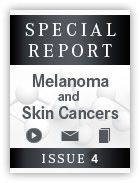Gene Removal May Pose Future Treatment in Advanced Melanoma
Despite the availability of several new agents in the past 5 years for the treatment of melanoma, patients with advanced melanoma still suffer poor prognoses.
Janice M. Mehnert, MD

Janice M. Mehnert, MD
Despite the availability of several new agents in the past 5 years for the treatment of melanoma, patients with advanced melanoma still suffer poor prognoses. Gene therapy is a novel strategy that, in the future, may become a useful tool against several malignancies.
Methods and Results
Recently the phase I group at the Rutgers Cancer Institute of New Jersey (CINJ) showed the feasibility and potential of treating advanced BRAF-mutationpositive melanoma by manipulating the essential autophagy geneAtg7.1Autophagy is an evolutionarily conserved prosurvival process that degrades deranged cellular organelles and proteins, and maintains cellular biosynthesis during nutrient deprivation or periods of metabolic stress.2While basal autophagy is important in all cells for the removal of damaged or long-lived proteins and organelles, the hyperactive autophagy in cancer cells not only confers stress tolerance but also maintains cancer cell growth by recycling intracellular components⎯thereby meeting metabolic demands.3,4In BRAF-mutationpositive melanoma, high rates of autophagy have also been implicated as the key mechanism of acquired resistance to targeted BRAF inhibitors.5The core function of autophagy is mediated by a cascade of ubiquitin-like proteins encoded by a group of genes named Atg that includesAtg7⎯the principal and the essential autophagy gene.The researchers at the CINJ, led by Janice M. Mehnert, MD, utilized a genetically engineered mouse model (GEMM) of melanoma driven by mutantBRAF V600Eand deficiency of the PTEN tumor suppressor gene. The consequences of the loss ofAtg7function, the autophagy gene, were then tested by 2 separate strategies.
In one methodology, theAtg7gene was made deficient at the genetic level at the tumor sites. While the absence of a single allele ofAtg7caused a slight reduction in tumor volume without any effect on overall survival, the loss of bothAtg7alleles profoundly suppressed melanoma growth and improved overall survival by more than 38%.2In a parallel experiment, daily hydroxychloroquin (HCQ), a known inhibitor ofAtg7activity, was administered to the GEMMs with established melanomas driven by mutant BRAF, deficient PTEN, and intactAtg7in order to cause systemic pharmacological inhibition of autophagy. Again, there was profound suppression of tumor growth.2
Clinical Pearls
- In general, autophagy is a prosurvival process that is active in most cells at a basal level
- Cancer cells utilize hyperactive autophagy in order to promote their own growth and develop drug resistance
- Atg7is the essential autophagy gene
- The experiments with the GEMM model, reported by Mehnert’s group at CINJ, have revealed that inhibiting or deleting theAtg7functionality reduces melanoma growth, improves survival, and rectifies resistance to BRAF inhibitors
- Clinical trials are testing the scope of the current results in patient populations
Complementing BRAF Inhibition WithAtg7Deficiency in the Clinic
Since autophagy has been found to be an important mechanism of drug resistance in BRAF-mutant melanoma, Mehnert et al subsequently investigated whether or not functional deficiency ofAtg7might amplify the effects of BRAF inhibition. Dabrafenib, a commercially available BRAF inhibitor, was utilized in the GEMM experiments. As expected, inhibition by dabrafenib resulted in a dramatic tumor volume reduction in all GEMMs with the requisiteBRAF V600Emutation. However, the tumor reduction was much more profound inAtg7-null compared with wild-typeAtg7tumors. The researchers concluded that the efficacy of BRAF inhibition in spontaneous melanomas is further increased by genetic removal ofAtg7, supporting the hypothesis thatAtg7overcomes senescence.“The results of these experiments are explosive, and the approach is already in the clinics,” commented Mehnert in an interview with Targeted Oncology. In a phase I trial, 2 weeks of HCQ was administered presurgery to patients with resectable stage 3/4 BRAF-positive melanoma. Autophagy markers were then evaluated in the blood, skin, and the tumor tissue.6Additionally, two separate trials at Abramson Cancer Center of the University of Pennsylvania are currently recruiting advanced melanoma patients withBRAF V600Emutation, and they are looking at Atg inhibition with HCQ in conjunction with either the BRAF inhibitor vemurafenib or the FDA-approved combination of oral dabrafenib and trametinib (D + T) inhibiting both BRAF and MEK.7,8Mehnert further advised Targeted Oncology that these early-phase trials could pave the way for more effective management of melanoma in the future.
References
- Xie X, Koh JY, Price S, White E, Mehnert JM. Atg7 overcomes senescence and promotes growth of BRAF V600E-driven melanoma.Cancer Discov. 2015;5(4):410-423.
- Degenhardt K, Mathew R, Beaudoin B, et al. Autophagy promotes tumor cell survival and restricts necrosis, inflammation, and tumorigenesis.Cancer Cell. 2006;10:51-64.
- Yang ZJ, Chee CE, Huang S, Sinicrope FA. The role of autophagy in cancer: therapeutic implications.Mol Cancer Ther. 2011;10(9):1533-1541.
- Corazzari M, Fimia GM, Lovat P, Piacentini M. Why is autophagy important for melanoma? Molecular mechanisms and therapeutic implications.Semin Cancer Biol. 2013;23(5):337-343.
- Ahn JH, Lee M. Autophagy-dependent survival of mutant B-Raf melanoma cells selected for resistance to apoptosis induced by inhibitors against oncogenic B-Raf.Biomol Ther (Seoul). 2013;21(2):114-120.
- ClinicalTrials.gov. Hydroxychloroquin in patients with stage III or stage IV melanoma that can be removed by surgery. https://clinicaltrials.gov/ct2/show/NCT00962845. Accessed April 14, 2015.
- ClinicalTrials.gov. A phase I trial of vemurafenib and hydroxychloroquin in patients with advanced BRAF mutant melanoma. https://clinicaltrials.gov/ct2/show/NCT01897116. Accessed April 14, 2015.
- ClinicalTrials.gov. The BAMM trial: BRAF, autophagy and MEK inhibition in metastatic melanoma: a phase 1/2 trial of dabrafenib, trametinib and hydroxychloroquin in patients with advanced BRAF mutant melanoma. https://clinicaltrials.gov/ct2/show/NCT02257424. Accessed April 14, 2015.
<<<
















